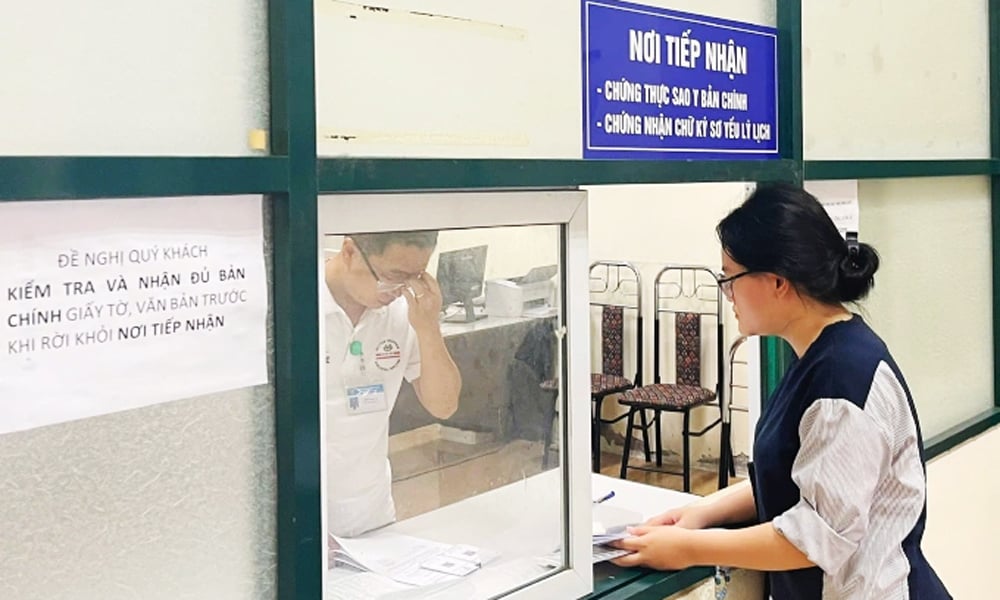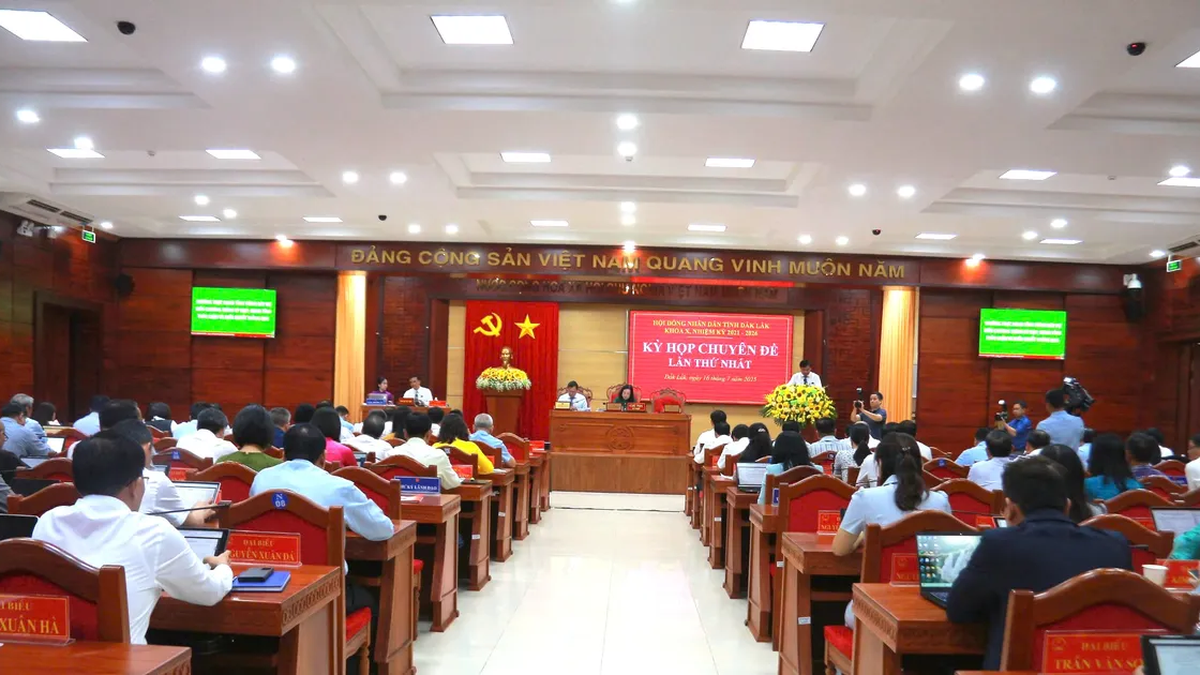This is one of many new points of the Notary Law 2024, which takes effect from tomorrow, July 1, after 10 years of implementing the Notary Law 2014.
People do notarization procedures at Notary Office No. 3, Cau Giay District, Hanoi . |
Article 50 of the new law stipulates: The person requesting notarization, the witness, and the interpreter must sign each page of the transaction in the direct presence of the notary, except in certain cases as prescribed.
"The signing of notarized documents in the presence of a notary must be photographed and stored in the notarization file," the law states.
The process of taking photos of "notaries witnessing the signing of notarized documents" must meet 3 requirements, according to Article 46 of Decree 104/2025 detailing a number of articles implementing the Law on Notarization.
a) Identify the person signing the notarized document and the notary performing the notarization;
b) Clear, sharp, not easily discolored or faded; no cutting, editing, adding, or removing details or background;
c) Printed in color or black and white on A4 paper; if using specialized photo paper, the minimum photo size is 13 cm x 18 cm.
Anyone who does not sign but points will also be subject to the above regulations.
Also according to Decree 104, if there are witnesses or interpreters, they must also take photos of them signing or fingerprinting in the presence of a notary.
If the person requesting the notarization and the notary deem it necessary, they can record a video of the process. From July 1, these photos and videos are recognized as a component of the notarization record and can only be stored and used in accordance with the law on storing notarization records.
Notarized land records are stored for at least 30 years.
The new law also stipulates that from July 1, notary organizations must store real estate transaction records for at least 30 years and at least 10 years for other types of transactions.
The 2014 Law does not specify a minimum record retention period for each type of transaction, but only sets out general requirements. Accordingly, the original notarized document and other documents in the notarized record must be retained for at least 20 years at the headquarters of the notary practice organization.
In Article 68, the new law classifies transactions according to their level of importance to prescribe the corresponding minimum retention period. Specifically, for transactions involving real estate, the law requires notary organizations to retain records at their headquarters for at least 30 years. For other transactions, the minimum retention period is 10 years.
Since the photo taken with the notary has been recognized as part of the notarized record, it also has a corresponding storage period.
Four cases notarized outside the headquarters
Article 46 of the 2024 Notarization Law stipulates that notarization must be performed at the headquarters of the notary organization. However, if the person requesting notarization falls into one of the following four cases, it can be performed outside the headquarters:
1. Make a will at the place of residence according to the provisions of the Civil Code.
2. Unable to travel due to health reasons; being hospitalized or quarantined as directed by a medical facility.
3. Being detained or imprisoned; serving a prison sentence; being subject to administrative measures.
4. There are other legitimate reasons as prescribed by the Government.
The concept of "other legitimate reasons" is explained in Decree 104/2025 to include the following cases:
a) Women who are pregnant or nursing children under 12 months old;
b) Elderly people, people with disabilities or people with difficulty moving;
c) People who are performing duties in the people's police force, people's army, people who assume responsibilities or are performing assigned work at the request of the agency, organization or enterprise where they work, and leaving their position will affect the assigned tasks, work or responsibilities they are undertaking;
d) In case of force majeure or objective obstacles, the person requesting notarization cannot come to the notary practice organization.
Notarization outside the headquarters must be performed at a location with a specific address, consistent with the reason for requesting notarization outside the headquarters.
People can notarize electronically and online from July 1
Depending on the needs of the parties involved in the transaction, electronic notarization can be performed directly or online. When performing direct electronic notarization, the person requesting notarization still transacts in the direct presence of the notary, applicable to all civil transactions.
Online electronic notarization is performed when the parties are not present at the same location and enter into a transaction via online means, in the direct presence of a notary. This applies to civil transactions, except for wills and other unilateral legal acts, according to Decree 104/2025 guiding the implementation of the 2024 Notarization Law.
Whether done in person or online, the transaction is then certified by a notary and a notary organization using a digital signature to create an electronic notarized document. This electronic document is as valid as a paper notarized document and as valuable as the original.
Also according to Decree 104/2024, the electronic notarization process must also comply with taking photos with the notary during the signing process.
Paper notarized records must be dataized.
According to Decree 104/2025, for transactions conducted from July 1, notary organizations must convert paper notarized records into data messages for electronic storage.
Records made before this date must also be converted and stored electronically by the notary public organization that is managing the records.
Notarized records after being converted into data messages must ensure the accuracy of content compared to paper notarized records and must be confirmed by a notary organization with a digital signature before being stored. The storage period is implemented as stated in Article 68 above.
With data-encoded paper notarized records, the original paper copy, or original paper copy, must still comply with the above rule (at least 30 years for land transactions, 10 years for other transactions). Other components of the paper record that are not the original or original must still be stored for at least 5 years, according to Decree 104/2025.
The list of transactions requiring notarization will be posted on the electronic portal.
The current Notary Law does not specify which types of transactions must be notarized. The new law has added provisions on transactions that must be notarized, but does not list the names of transactions but prescribes criteria for determination.
Specifically, a notarized transaction "is an important transaction, requiring a high level of legal security and is required by law or by law assigned by the Government to be notarized."
The law assigns the Ministry of Justice the responsibility of reviewing, updating, and posting transactions that must be notarized and certified on the Ministry of Justice's Electronic Information Portal. This helps people and businesses easily identify transactions that must be notarized, increasing transparency in the process of law enforcement.
According to current regulations, contracts that must be notarized to be legally valid mostly relate to the transfer of property, land use rights, etc.
Notary not over 70 years old
A person considered for appointment as a notary must be a Vietnamese citizen not over 70 years old and will automatically be dismissed upon reaching this age.
If by July 1, a notary over 70 years old is still practicing, he/she is allowed to practice for another two years. After the above period, the notary is automatically dismissed.
In addition, the new law also reduces one type of document when notarizing a contract, which is the request form. Thus, the citizen's file only needs 4 documents ( see details ).
The 2024 Notary Law officially takes effect from July 1, 2025, consisting of 8 chapters and 76 articles, 2 chapters and 5 articles less than the old law.
According to VnExpress
Source: https://baobacninhtv.vn/tu-1-7-phai-chup-anh-viec-ky-van-ban-truoc-mat-cong-chung-vien-postid420967.bbg







































































































Comment (0)